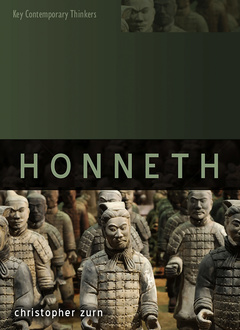Description
Axel Honneth
Key Contemporary Thinkers Series
Author: Zurn Christopher
Language: English
Subject for Axel Honneth:
Publication date: 04-2015
240 p. · 15.1x22.9 cm · Paperback
Publication date: 04-2015
240 p. · 16x23.5 cm · Hardback
Description
/li>Contents
/li>Readership
/li>Biography
/li>
With his insightful and wide-ranging theory of recognition, Axel Honneth has decisively reshaped the Frankfurt School tradition of critical social theory. Combining insights from philosophy, sociology, psychology, history, political economy, and cultural critique, Honneth?s work proposes nothing less than an account of the moral infrastructure of human sociality and its relation to the perils and promise of contemporary social life.
This book provides an accessible overview of Honneth?s main contributions across a variety of fields, assessing the strengths and weaknesses of his thought. Christopher Zurn clearly explains Honneth?s multi-faceted theory of recognition and its relation to diverse topics: individual identity, morality, activist movements, progress, social pathologies, capitalism, justice, freedom, and critique. In so doing, he places Honneth?s theory in a broad intellectual context, encompassing classic social theorists such as Kant, Hegel, Marx, Freud, Dewey, Adorno and Habermas, as well as contemporary trends in social theory and political philosophy. Treating the full range of Honneth?s corpus, including his major new work on social freedom and democratic ethical life, this book is the most up-to-date guide available.
Axel Honneth will be invaluable to students and scholars working across the humanities and social sciences, as well as anyone seeking a clear guide to the work of one of the most influential theorists writing today.
Abbreviations
1 Introduction
1.1 A Brief Biography
1.2 Honneth’s Themes
1.3 Intellectual Contexts
2 Individuals’ Struggle for Recognition
2.1 The Intersubjectivist Turn
2.2 Self-Confidence and Love
2.3 Self-Respect and Rights
2.4 Self-Esteem and Solidarity
2.5 Antecedent Recognition
2.6 Critical Perspectives
3 Social Struggles for Recognition
3.1 Conflicts of Interest vs. Moral Conflicts
3.2 Social Struggles for Recognition
3.3 Historical Progress
3.4 Critical Perspectives
4 Diagnosing Social Pathologies
4.1 Social Philosophy as Social Diagnosis
4.2 Social Pathologies as Second-Order Disorders
4.3 Critical Perspectives
4.4 Recapitulation
5 Recognition and Markets
5.1 Work and Recognition
5.2 Fraser’s Challenges, Honneth’s Responses
5.3 Assessing an Unfinished Debate
6 Social Freedom and Recognition
6.1 Introduction
6.2 Social Freedom
6.3 Social Spheres
6.4 Innovations and Critical Perspectives
7 Concluding Speculations
Bibliography




